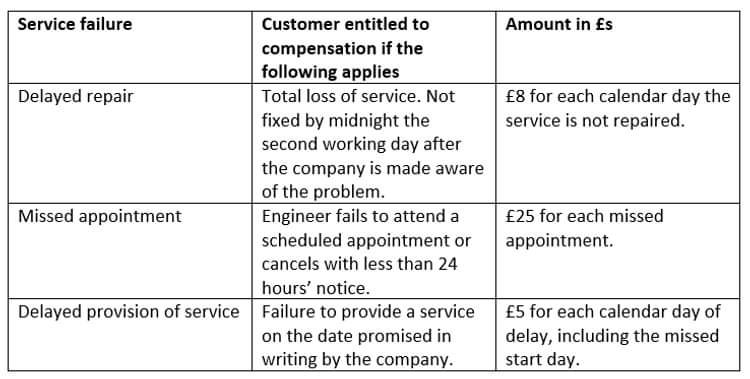Automatic broadband compensation: Five things you might not know

New measures entitling consumers to automatic compensation when they experience broadband problems took effect last week.
New measures entitling consumers to automatic compensation when they experience broadband problems took effect last week (Monday 1 April 2019). The changes, introduced by communications regulator Ofcom, are designed to ensure compensation is provided automatically, fairly and consistently to consumers who receive poor service.
At the same time, they are intended to act as an incentive to providers to fix issues quickly in the first place. At the Communications Ombudsman we’re getting lots of questions from consumers about the new rules – and it’s fair to say there is a degree of confusion out there.
Now that the dust has settled on Ofcom’s announcement, we’ve put together this post, which we will help to bust some myths and address the odd misconception. Here are five things you might not know about automatic broadband compensation.
1) It’s a voluntary scheme – and only some companies have signed up
The new scheme isn’t mandatory, meaning the question of whether you’re entitled to automatic compensation will depend on which provider you’re with. BT, Sky, TalkTalk, Virgin Media and Zen Internet had already signed up to the scheme. Meanwhile, Ofcom has announced that Hyperoptic and Vodafone have also signed up and will start paying compensation automatically at some point later this year. If your broadband provider isn’t on the above list, automatic compensation won’t apply to you.
2) It only applies to certain problems
If your broadband has signed up to the scheme, you will be entitled to automatic compensation for delayed fault repairs, delayed installations and missed engineer appointments. The scheme requires that automatic compensation payments are credited to the customer’s account within 30 days of the service delay or of the service being restored, and within 30 days of a missed appointment.
3) The level of compensation depends on the problem
The level at which compensation is set is based on Ofcom’s research into harm caused to the average consumer. Here’s how the scheme works in a nutshell:
4) It isn’t just about broadband
The new scheme applies to landline phone services as well as broadband. Looking at the above table, “total loss of service” in the context of landlines would mean that the customer is either unable to make an outgoing call or receive an incoming call, or the service only allows for one-way speech (i.e., only one party in the call can hear the other person or be heard). Ofcom has found recently that while Britons spend half as much time using their landlines as they did in 2012, the traditional ‘home phone’ still accounted for 54 billion minutes of calls in 2017.
5) There are some exceptions
In some situations, automatic compensation won’t be applicable. Examples include where:
- there is a loss of service, a delay in provision or a missed appointment, but this is the result of the customer’s actions or failure to do something; and
- an appointment is offered by a provider to repair a service or install a service, which the consumer refuses. In these circumstances, the provider is taking reasonable steps to fix the problem and so isn’t deemed to be liable for compensation.
How we can help
If your broadband / landline provider is a member of the Communications Ombudsman scheme, we might be able to help if you have experienced broadband or landline problems. Click here to check if we are able to review disputes with your provider. If your provider has signed up to the automatic broadband compensation scheme, we may be able to help if you believe the rules haven’t been applied correctly.
You should speak to your provider in the first instance and you’ll need to give them eight weeks to resolve your complaint before you can escalate it to us.
More articles

Complaints About Telecom Providers Increase 28% in 2024

Communications Ombudsman welcomes Ofcom’s proposal to shorten the timeline in which consumers can access Alternative Dispute Resolution

What is an Ombudsman?

Communications Ombudsman releases updated complaints data for 2024
Ready to raise your dispute with us?

